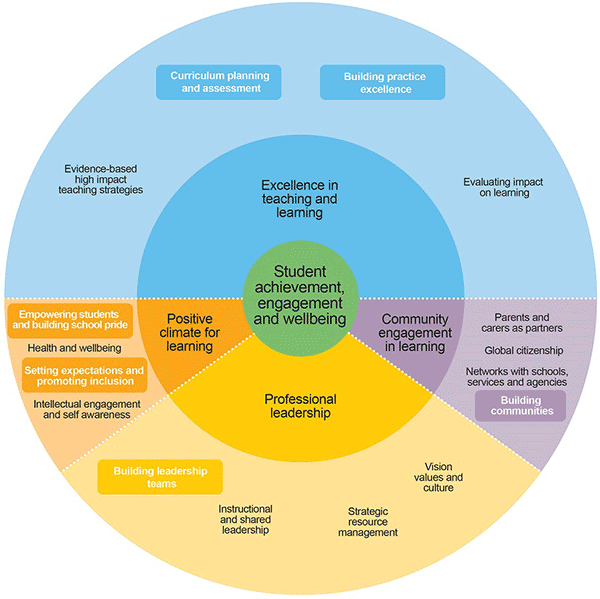This dimension is part of the
Community Engagement in Learning priority.
Navigate the FISO Improvement Model

Overview
Global citizenship means an awareness of the interconnectedness among people, societies and environments around the globe. It emphasises responsibilities and contribution to a global society and economy. When students develop a sense of global citizenship, they learn to respect seminal universal values such as peace, sustainability and upholding the human rights and dignity of all people.
Global citizenship programs develop students' knowledge, skills, attitudes and values. Effective schools draw on real-life intercultural experiences which deepen students' understanding of the world and their place in it.
Improvement measures
Schools can use assessment against the Civics and Citizenship Curriculum Achievement Standards.
Supporting resources
The VTLM:
Practice Principles
VCAA Intercultural Capability Teaching Resources
Continuum
The Continuum for Global citizenship describes a range of proficiency levels (Emerging, Evolving, Embedding and Excelling) that assists principals and teachers to identify areas of practice that require attention in order to deliver improved student outcomes.
Component: The school develops systems to guide a global focus
Emerging
Discussions directed by leaders have convinced school councillors, parents, teachers and students that the school needs to adopt a curriculum that fosters global citizenship and intercultural capacity. Leaders support teachers to run whole-school activities designed to lift the profile of global education and develop global citizenship and intercultural capability.
Evolving
Leaders establish and direct a working group to guide, support, monitor and report on the school’s global learning practices. Leaders establish a working group to audit the curriculum to determine the extent to which global citizenship is integrated sequentially through the curriculum.
Embedding
Leaders provide resources to support the staged development and implementation of a global citizenship curriculum. Leaders oversee a global citizenship working group to collaboratively develop a school- wide plan, identifying milestones for integrating global learning, intercultural capability and languages education.
Excelling
Leaders engage with culturally diverse communities, identifying and establishing partnerships that promote practical application of students’ language- learning, as well as their global and intercultural capabilities. Leaders establish and sustain a ‘sister school’ arrangement with one or more schools.
Component: The school develops teacher capacity in global citizenship
Emerging
Teachers are encouraged to work in teams when devising their global citizenship curriculum. Teachers visit each other’s classrooms to observe and give feedback on how classes are promoting students’ intercultural capabilities.
Evolving
Teachers work in teams to promote the integration of a global focus across curriculum learning areas and year levels. Teachers receive support to attend programs that focus on learning about cultural understandings and practices, and/or language learning.
Embedding
Teachers develop their awareness of where to access online resources to inform their globalisation unit and lesson planning and share this with their colleagues. Leaders support teachers to access professional reading and teaching resources that support them to improve their curriculum development and teaching of intercultural capabilities.
Excelling
Teacher promote efficacy in developing students’ global preparedness through participation in conferences, international study tours and teacher exchanges. Teachers demonstrate leadership in promoting global citizenship, intercultural capacity and languages education by supporting other schools to become globally focused.
Case studies
To see examples of how schools in Victoria are implementing the FISO dimension: Global citizenship see Global citizenship case studies.
Evidence base
To view the Evidence Base for the FISO community engagement in learning priority area see:
 Evidence- Community engagement in learning evidence base.
Evidence- Community engagement in learning evidence base.
FAQs
Why should my school engage with this dimension?
- Interaction with other nationalities and cultures can help give students a stronger outward perspective. Carefully designed programs that increase interaction between students of different nationalities can help improve intercultural attitudes.
- Research shows that intergroup contact typically reduces prejudice and that positive interracial contact between school-aged young people can encourage positive interracial attitudes.
- Carefully designed E-contact programs can successfully promote intergroup harmony in both the short-term and long-term.
- A report documenting the benefits of sister school relationships in Victoria found that such programs can have positive effects on student global awareness, attitudes and responses. These benefits are of greatest significance once relationships are well established and embedded within the school.
To what extent is this dimension being implemented in my school?
Consider whether your students are globally engaged. What programs establish and sustain international partnerships that provide students with a deep understanding of the world and rich experiences of other cultures, aligned to curricula and learning objectives?
What can my school focus on?
- Audit curriculum programs to determine the extent to which teaching aspects of global citizenship are integrated throughout the curriculum.
- Draw on local and international examples of effective practice to embed a culture of inclusion based on a deep understanding of intercultural capability, societal diversity and its benefits.
What does successful implementation look like?
- Program and lesson design integrate international perspectives, and development of students' self-identity and responsibilities as global citizens.
- Programs develop student capacity to apply principles of conflict resolution to real-world situations.
- The school supports students to lead and contribute to projects, including those with schools in other countries, which improve the quality of the environment and/or promote sustainability.
What strategies and actions can my school implement?
- Establish and sustain international (sister school) partnerships that provide students with rich experience of other cultures, aligned to curricula.
- Provide authentic opportunities for active citizenship for all students.
- Enable students to become involved in community activities that support social cohesion and peace building, both within and beyond the school community.
- Involve students in community sustainability initiatives that are connected to global issues.
More information
For more information, see
Community Engagement in Learning priority.